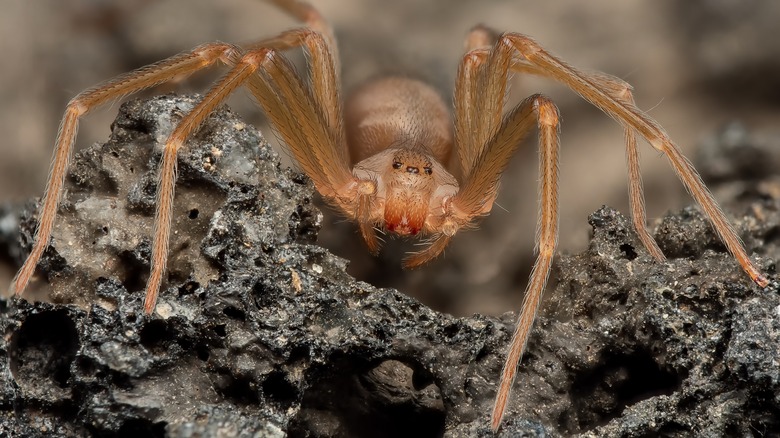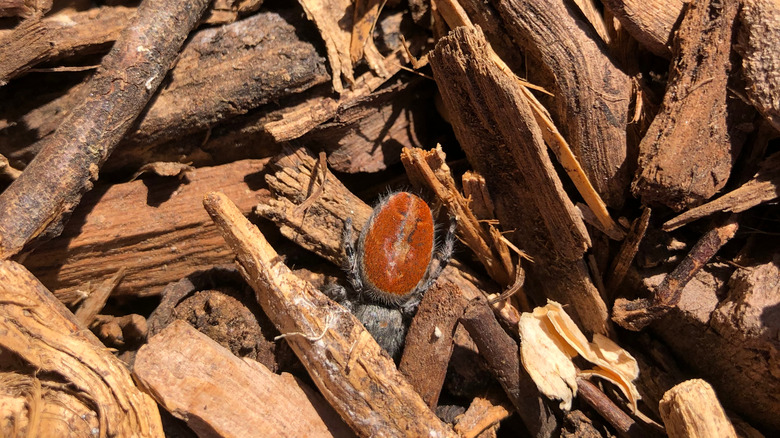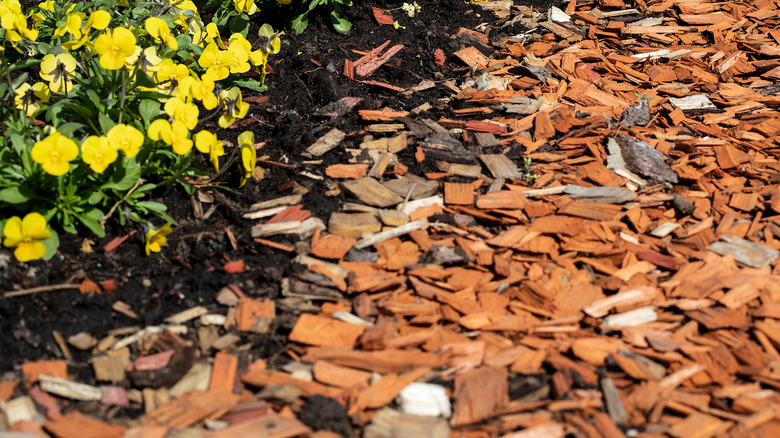The Mulch Mistake That'll Attract Spiders To Your Basement
Seeing as the U.S. alone is home to more than 3,500 species of spiders, it's safe to say most individuals don't want them in their homes. Seeing as basements offer spiders a safe place to hide, it's no surprise that these dark areas are prone to arachnid infestations. However, your landscaping choices might be attracting spiders to your home, with mulch being the main culprit.
Does this mean there's no place for mulch in your landscaping? Not exactly. You can still mulch flower beds and around trees, provided these areas aren't too close to your home. There are also types of mulch said to repel spiders, such as cedar, making this material a viable option for homeowners who love the appearance of fresh mulch. However, the takeaway is that you don't want to spread mulch near your house as you'll attract unwanted pests, spiders included. Although most house spiders are harmless, the black widow and brown recluse are two highly dangerous species you don't want lurking about. As such, it's best to take all precautions to keep arachnids from invading your house, starting with your mulch.
Why do spiders like mulch?
Spiders look for safe spaces to hide out, and mulch provides them with plenty of shelter as they make their way to your basement. Even better, mulch attracts other insects, including ants, cockroaches, and earwigs, all items in a spider's buffet. Sometimes a spider infestation is a sign of other pests roaming about your house, and mulch — although attractive — isn't doing you any favors.
Wood dust is another common feature of mulch, drawing spiders near. Wolf spiders are one type of arachnid that gravitate toward mulch, and seeing as they can grow to be 1.5 inches long, you probably don't want them crawling about in your home. But mulch isn't the only thing you need to worry about. If you have shrubs, bushes, piles of wood, or other landscaping elements close to your home, you're inviting spiders — and other pests — indoors. This doesn't mean you need to rip out your landscaping. Instead, keep your yard well-maintained and trim bushes close to your house, keeping 18 inches of space between your home and any foliage.
Consider cedar mulch
Luckily, you can repel some spiders and other pests with cedar wood mulch. Although you might enjoy the smell of cedar, it's thought that certain types of spiders and other insects find the scent to be particularly offputting. The drawback is that you have to re-mulch when the fresh smell of cedar fades and its oils dissipate, but this is true with any form of home DIY pest prevention. Unfortunately, cedar mulch is much more expensive than other types of mulch, which can deter homeowners from using it, especially if they have a large exterior space they're looking to landscape.
There are workarounds, however. If you like the appearance of mulch, you could use cedar wood chips in front of your home, reducing how much product you'd need to purchase. You could then put rocks around the other three sides of your home's exterior. Although rock is more expensive than mulch, it's low-maintenance and you don't have to continuously replace it, whereas mulch should be replaced annually. Since rock doesn't degrade like mulch does, you'll attract far fewer pests, spiders included.
In addition to switching up the type of mulch you use, you should also seal any cracks or gaps in your home's foundation, working to prevent pests in the first place. Ensure windows are also properly sealed and add weather stripping to gaps around doors. If you have a spider infestation, it's probably best to contact a professional pest control technician.


